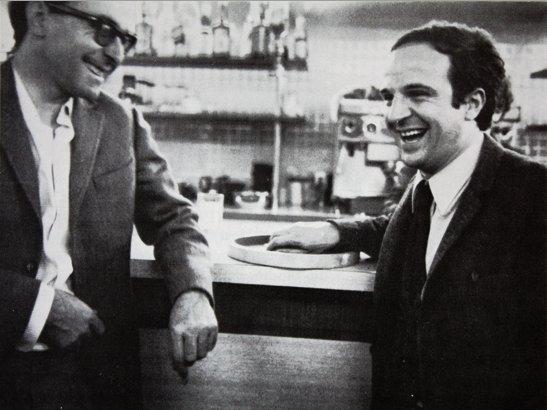At the heart of the creative orgy that was the Nouvelle Vague was one key love affair. A love affair so passionate it wasn't long before it turned into a full-blown hate affair. The friendship and fallout of directors Jean-Luc Godard and François Truffaut is the subject of Emmanuel Laurent's new documentary, Two in the Wave. For any Nouvelle Vague-ist, it ought to have been a joy. And for 50 minutes or so, it was. The story begins with the night of Les quatre cents coups's 1959 Cannes premiere. The night Truffaut the critic became Truffaut the director. The night the Nouvelle Vague was born.
Thrilling archive guides us through those heady days. The child star, Jean-Pierre Léaud, and Truffaut promenade jauntily by Cannes's sea wall. They look up giddily at their film's poster. Press mug them. The jealousy of his former Cahiers du Cinéma colleague Godard is felt as we are fed next day's glowing notices. Godard - the spoilt dandy to Truffaut's punky boy-done-good - struggles to catch up. Truffaut writes Godard a screenplay. Godard transforms it and races past Truffaut with À bout de souffle (1960).
The story is familiar enough. But Laurent's storytelling is fresh. An economical voiceover script from Antoine de Baecque, all in the present tense, electrifies the process of collaboration and cross-fertilisation of the Cahiers du Cinéma gang (Bazin, Rohmer, Chabrol). We get cameos from heroes, from Cinémathèque Française founder Henri Langlois and Fritz Lang. Truffaut talks of Hitchcock, Godard Rosselini. They mock Marcel Carné and the old rules. There are priceless snapshots of audience reactions to À bout de souffle. "Unfortunate," shrugs one old Gaul. "But we have to adapt."
Backlash snapped at the heels of success. As perversion crept into their cinematic language and sales slumped, articles proclaimed the directors of the Nouvelle Vague "incompetent auteurs" unleashing "failure and unemployment" on the French film industry. We see clips of their Sixties films. We get a terrific burst of archive footage of Truffaut and Godard at the 1968 Cannes Festival demanding they shut up shop and join the strikers. Tantalisingly, we also see the start of the political split, Godard insisting that no film has represented the truth of what the workers were fighting for, Truffaut recoiling. Godard subsequently thrusts the art form into Marxist fatigues, while Truffaut continues to clothe it in more aesthetic poses.
We hit the moment of unravelling. And at this crucial point, the film bottles it. Director Laurent, perhaps thinking that, if he changed the subject quietly enough, we might not realise what he was doing, suddenly transfers his gaze to the career of Léaud. Meanwhile the real struggle that will consume Godard and Truffaut until Truffaut's untimely death is given only one final outing, in a recounting of their infamous epistolary duel. Having stormed out of the 1973 premiere of Truffaut's La nuit Americaine, Godard wrote Truffaut a letter, accusing him of being a fascist and a liar. Truffaut responded by saying that Godard was a shit. And that was it. Or so Laurent would have us believe.
Unlike their falling in love, about which every detail is laid bare, Laurent presents their falling out without context, afterthought or consequence. It is a simple full stop to events. The undercurrents so often talked about (nothing of Godard's anti-Semitism that Truffaut so hated) are left unexplored. Beyond this point, Laurent seems unwilling to look. Could he not face delving further? Or could he just not be bothered? Either way, this firecracker of a relationship deserves more.
 Find the films of Jean-Luc Godard on Amazon
Find the films of Jean-Luc Godard on Amazon Find the films of François Truffaut on Amazon
Find the films of François Truffaut on Amazon Find Two in the Wave on Amazon
Find Two in the Wave on Amazon
Part one of Une histoire d'eau (1961) written and directed by François Truffaut and Jean-Luc Godard













Add comment